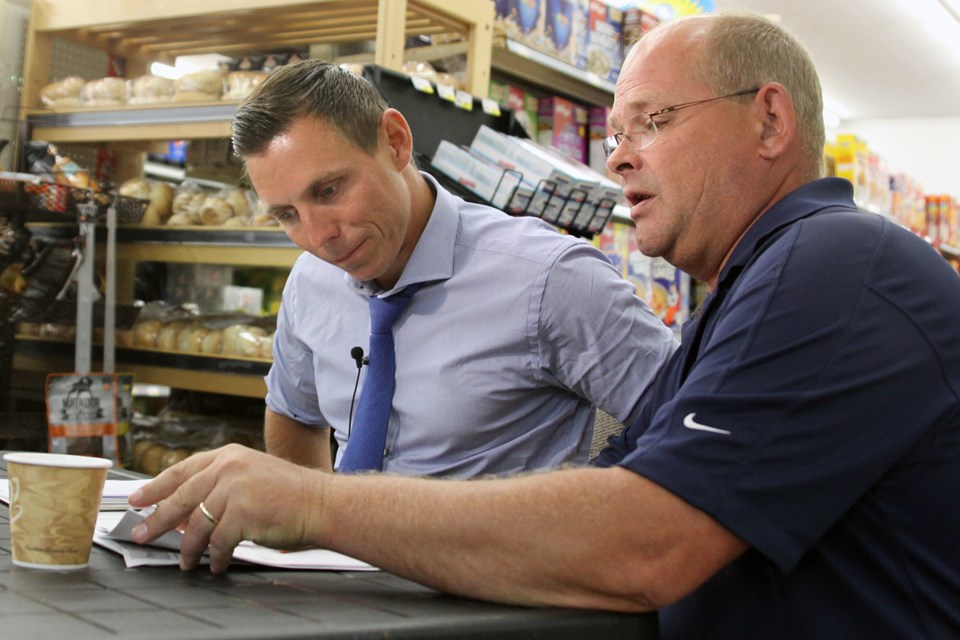KAKABEKA FALLS, Ont. – Patrick Brown refuses to label the rash of renewable energy agreements signed by the incumbent Liberal government as green contracts. To him, they are simply bad deals.
The Green Energy Act – which Brown termed an “unmitigated disaster” – was in his crosshairs as the current Opposition leader who is aiming to be the province’s first Progressive Conservative premier since 2003 challenged the Kathleen Wynne-led Liberal government on what he called a hydro crisis during a Monday visit to Northwestern Ontario.
Brown announced a Progressive Conservative government would put an immediate freeze on signing any new contracts until the energy needs of the province are studied, putting an end to what he called “sweetheart deals” that he accused the Liberals of using to reward their donors and friends.
“We have this massive over generation. We’ve given $6 billion away since 2009,” Brown said at a Monday media conference at Odena Foods in Kakabeka Falls, his second visit to the grocery store to rally against Liberal energy policy in less than a year.
“Kathleen Wynne is off doing these governors’ conferences in the U.S. and she’s probably down there accepting thank you notes. She’s become the best minister of economic development that Pennsylvania, Michigan and Ohio have ever seen because she’s giving Ontario electricity at a loss and our own green energy we’re spilling here. How is that right?”
While putting a moratorium on new deals is a piece of the puzzle, Brown said he would look for opportunities to escape from existing contracts.
Brown cited the province’s 2009 deal with Samsung – the only one where details have come out publicly – after the PCs last year revealed it included an exit clause that would have voided the contract without cost, saving $1.5 billion in surplus electricity production.
“I’m going to look at every contract to see if there are similar exit provisions. It’s about putting families first, not those who benefit from these ugly contracts,” Brown said.
Odena Foods owner Kent Maijala said his June electricity bill increased by more than $2,000 compared to the previous year, even though the relatively cooler month meant he used less air conditioning than he did in 2016.
The Wynne government doesn’t seem to care about small businesses, Maijala said.
“The strings get tight. The money sometimes isn’t there to do what you want to do. There’s a lot of stuff that I’ve wanted to do to my store to improve it,” Maijala said, explaining he has wanted to give the décor a facelift as well as adding more energy efficient coolers and freezers.
“I’ve spent a lot of money this year on freezers and bakery equipment just to see if I can reduce my hydro rate and my hydro bill.”
Of the $11,000 bill, Maijala said about $4,000 was attributed to the global adjustment fee, a cost that has to get passed on to the consumer.
“Significant amounts have to,” Maijala said. “You have to meet the bottom line and meet your margins to be able to stay open.”
Just as the road to the next election – expected for June 7, 2018 – has many kilometres ahead, Brown has ground to cover to reach an electorate that largely views him as an unknown commodity.
A Forum Research Poll conducted last month found 45 per cent of respondents would not be able to identify which issues are important to Brown, who responded he would redirect health care funding from bureaucracy towards frontline resources and protect education in rural and Northern Ontario communities by halting any further school closures.
Some of the toughest territory for Brown would appear to be in Thunder Bay, where there hasn’t been a sitting Progressive Conservative MPP since Mickey Hennessy lost his seat in the former Fort William riding in 1987.
But the party leader pointed to this year’s by-election in Sault Ste. Marie, where PC candidate Ross Romano picked up the party’s first win in the riding since 1981 when Brown was just two years old and Bill Davis was premier.
“I think what we saw in Sault Ste. Marie is the tip of the iceberg,” Brown said. “I think we’re going to see some significant Progressive Conservative growth in Northern Ontario.”
